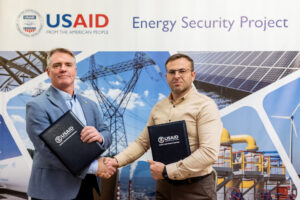 On Wednesday, September 13, the USAID Energy Security Project (ESP) organized a roundtable discussion focusing on the use of small and medium-sized cogeneration to power critical infrastructure during the upcoming heating season. Various energy sector representatives participated in the discussion, including the Ministry of Infrastructure, the Ministry of Energy, the State Agency on Energy Efficiency and Energy Saving, the National Energy and Utility Regulatory Commission (NEURC), representatives of local governments, and heads of heat supply companies.
On Wednesday, September 13, the USAID Energy Security Project (ESP) organized a roundtable discussion focusing on the use of small and medium-sized cogeneration to power critical infrastructure during the upcoming heating season. Various energy sector representatives participated in the discussion, including the Ministry of Infrastructure, the Ministry of Energy, the State Agency on Energy Efficiency and Energy Saving, the National Energy and Utility Regulatory Commission (NEURC), representatives of local governments, and heads of heat supply companies.
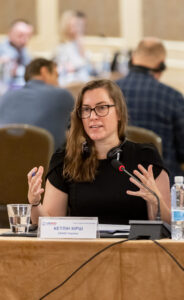 In her welcoming remarks, Kathleen Kirsch, Energy Team Lead of the Office of Economic Growth, USAID/Ukraine, reminded us that since the beginning of the war, USAID has prioritized the supply of critical equipment and materials to keep Ukrainian homes warm and will continue to do so, while Russia focuses its attacks on the Ukrainian energy infrastructure.
In her welcoming remarks, Kathleen Kirsch, Energy Team Lead of the Office of Economic Growth, USAID/Ukraine, reminded us that since the beginning of the war, USAID has prioritized the supply of critical equipment and materials to keep Ukrainian homes warm and will continue to do so, while Russia focuses its attacks on the Ukrainian energy infrastructure.
We learned a lot from last winter and know how to better prepare for the new winter season. This year, USAID is focusing on a new type of support to strengthen Ukraine’s energy security and enhance the protection of local critical infrastructure from Russian attacks. This new support includes 69 cogeneration units for 23 district heating utilities and two universities this winter, which will help the district heating system supply heat to Ukrainian homes in the absence of electricity, Ms. Kirsch said.
These USAID-funded cogeneration units can provide heat to approximately one million people and up to 1,000 social facilities in Ukraine, such as hospitals, schools, and kindergartens. In addition, small and medium-sized cogeneration units installed in district heating systems will contribute to the development of distributed generation, making heat generation more available during electricity supply interruptions, sustainable, and more effective. In the future, USAID plans to increase the number of cogeneration units, thus improving the supply of energy to the Ukrainian people.
Dmytro Kovalenko, NEURC Commissioner, thanked USAID ESP for being the driver of this process. He emphasized that NEURC is currently forming a regulatory framework based on the practical operation of cogeneration units, and this is the right way to go.
For us, this is a new direction for the development of Ukraine’s power system, in particular the development of distributed generation. This is the direction that is needed. At the beginning of the heating season, the pace you set is very important, and God willing, we will keep up with it. But we will do our best because we need it, he added.
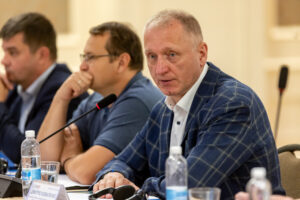 Yaroslav Demchenkov, Deputy Minister of Energy of Ukraine, noted USAID ESP’s work to strengthen Ukraine’s energy security. According to him, cogeneration makes it possible to reduce carbon emissions and is extremely important for the development of green energy. "We are now analyzing how the regulatory environment can be improved to stimulate the development of cogeneration technology," he said. In addition, Natalia Khotsyanivska, Head of the Utilities Department at the Ministry of Infrastructure, and Viktor Bilko, Deputy Head of the State Agency on Energy Efficiency and Energy Saving of Ukraine, noted the ongoing support provided by USAID for energy and for the development of cogeneration.
Yaroslav Demchenkov, Deputy Minister of Energy of Ukraine, noted USAID ESP’s work to strengthen Ukraine’s energy security. According to him, cogeneration makes it possible to reduce carbon emissions and is extremely important for the development of green energy. "We are now analyzing how the regulatory environment can be improved to stimulate the development of cogeneration technology," he said. In addition, Natalia Khotsyanivska, Head of the Utilities Department at the Ministry of Infrastructure, and Viktor Bilko, Deputy Head of the State Agency on Energy Efficiency and Energy Saving of Ukraine, noted the ongoing support provided by USAID for energy and for the development of cogeneration.
Mike Trainor, Chief of Party at USAID ESP, said cogeneration is important for wartime security and Ukraine’s post-war recovery.
Our goal is to help the Government of Ukraine build a technically efficient, environmentally sustainable, and financially stable district heating system in Ukraine. That is why we continue to provide technical assistance to Ukraine and support energy market reform, its integration into EU structures, and preparatory efforts for post-conflict reconstruction. USAID ESP is working with national and local Ukrainian partners to implement dozens of projects to install small and medium-sized cogeneration units in boiler houses, adapt the regulatory framework for the integration of cogeneration units, and ensure the uninterrupted operation of existing heat sources, as small cogeneration units add stability to the power system, especially in emergencies, he noted.
The discussion between representatives of the energy regulator, state, and local authorities, as well as district heating companies and experts focused on four main topics:
- Preparation and main provisions of draft regulations on the connection of critical infrastructure facilities to cogeneration units for power supply in the event of interruption of power supply of the Integrated Power System of Ukraine.
- Determination of the cost of gas used by heat supply companies to generate electricity from cogeneration units to meet the electricity needs of the boiler houses.
- Licensing of economic activities to produce heat energy by small and medium-sized cogeneration units.
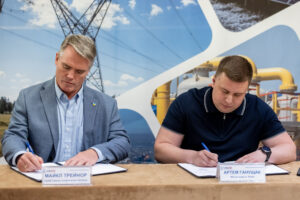 According to NEURC, the necessary amendments regarding the connection of cogeneration units have already been made to the primary legislation. In addition, shortly before the event, on September 12, 2023, NEURC approved its draft Resolution On Amendments to the Licensing Conditions for Heat Energy Production. It provides for an exemption from obtaining a license for heat producers who have cogeneration units if the total installed heat capacity does not exceed 3 MW (2.6 Gcal/h), and if during a power cut these units are used as a backup source of energy to power critical facilities and/or heat supply, water supply, water disposal facilities, and social welfare institutions.
According to NEURC, the necessary amendments regarding the connection of cogeneration units have already been made to the primary legislation. In addition, shortly before the event, on September 12, 2023, NEURC approved its draft Resolution On Amendments to the Licensing Conditions for Heat Energy Production. It provides for an exemption from obtaining a license for heat producers who have cogeneration units if the total installed heat capacity does not exceed 3 MW (2.6 Gcal/h), and if during a power cut these units are used as a backup source of energy to power critical facilities and/or heat supply, water supply, water disposal facilities, and social welfare institutions.
On April 25, 2023, NEURC adopted similar changes to the licensing of electricity generation from cogeneration units by amending the Electricity Generation License Conditions. The Regulator is currently working to further improve the regulatory framework governing the use of cogeneration. Discussions are underway to amend the Distribution Network Code, the Transmission Network Code, etc. to further address cogeneration unit use organizational issues. However, it’s still necessary to discuss how to regulate the sale of electricity generated by cogeneration units to power critical infrastructure facilities and determine the optimal model of contractual relations.
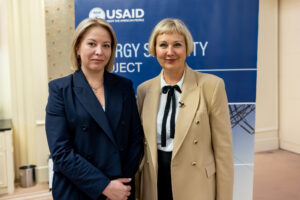 Pavlo Karas, CEO of Cherkasyteplocomunenergo, shared the experience of his company, which has been using cogeneration units since 2004, and noted the great potential of distributed cogeneration. He said that during the previous heating season under the full-scale war, thanks to distributed cogeneration, the heat was supplied to the city of Cherkasy almost without emergency outages. Simultaneously, he emphasized the need to train the staff of heat-generating enterprises on the specifics of working in the electricity market, which is necessary if the companies want to sell the excess electricity generated by cogeneration units to the general grid.
Pavlo Karas, CEO of Cherkasyteplocomunenergo, shared the experience of his company, which has been using cogeneration units since 2004, and noted the great potential of distributed cogeneration. He said that during the previous heating season under the full-scale war, thanks to distributed cogeneration, the heat was supplied to the city of Cherkasy almost without emergency outages. Simultaneously, he emphasized the need to train the staff of heat-generating enterprises on the specifics of working in the electricity market, which is necessary if the companies want to sell the excess electricity generated by cogeneration units to the general grid.
At the end of the discussion, USAID ESP signed Memoranda of Cooperation with the Rivne City Council, Zaporizhzhia Polytechnic National University, Khmelnytsky National University, and heat supply companies in Chernihiv, Chernivtsi, Lutsk, Dubno, Shepetivka, Starokostiantyniv, and Kamianets-Podilskyi. These memoranda provide for cooperation between the partners in attracting and using international technical assistance, including the supply of cogeneration units, and transfer of machinery, equipment, and materials to ensure heat supply to the Ukrainian partners’ facilities during martial law, as well as modernization of the heat supply system during the recovery period after the end of hostilities and the implementation of USAID technical assistance programs in Ukraine through the USAID Energy Security Project.
For additional information:Since the beginning of Russia’s full-scale invasion of Ukraine, the USAID Energy Security Project (ESP) team has been working to meet the urgent needs of Ukrainian energy companies for critical equipment and supplies to restore power to Ukrainian homes and to support the Government of Ukraine in preparing for the winter season. USAID ESP has provided the following assistance:
- 836 generators to assist Ukrainian energy companies in supplying electricity, gas, heat, and water, as well as to support local authorities in providing primary healthcare sanitation, and safe transportation to millions of civilians, especially in the most affected areas.
- 2 stationary and 48 mobile boiler houses in 11 oblasts of Ukraine to provide heat and hot water when heating facilities are damaged. This year, ESP will also deliver 72 mobile boilers and 3 stationary boilers, the latter to help Kherson after the flood.
- 59 pumps to replace damaged pumps.
- 223 temporary heated tents.
- 40 excavators for DH companies in 30 cities.
- 20 emergency vehicles for DH companies and another 40 trucks will be delivered this season.
- 100 km of steel and pre-insulated pipes and almost 12,000 units of related parts, as well as 6,490 tons of salt to keep the DH equipment in working order, with deliveries to continue.
In addition to responding to emergencies, USAID ESP provides support as a procurement agent for the Ukraine Energy Support Fund. Through this instrument, many enterprises in the heat supply sector receive material support – primarily CHPs, but also other heat supply companies.
